67 F. average high on May 7.
70 F. Twin Cities high on May 7, 2016.
May 8, 1924: A snowstorm brings up to 4 inches to parts of Minnesota. Minneapolis sees a half inch of snow with St. Paul picking up an inch. Up to 50 mph winds accompany the snow.
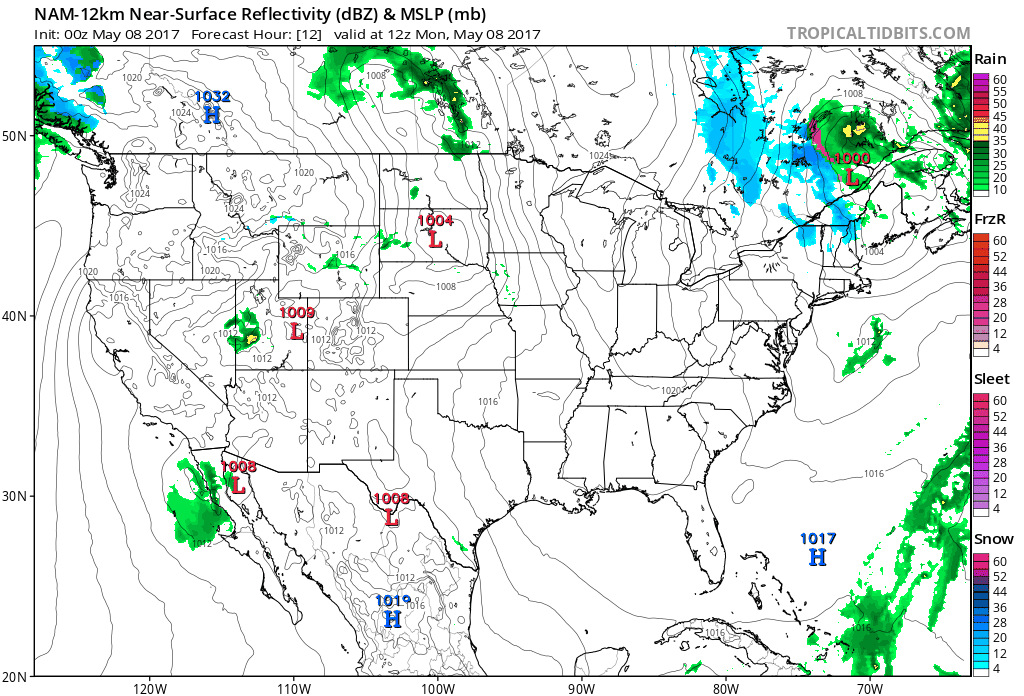
When It Comes to Weather Everyone's a Critic
"To avoid criticism say nothing, do nothing, be nothing" said Aristotle. If I say the sky is blue a dozen people will disagree with me. Including my wife.
"You said the sun would be out!" my bride of 33 years muttered yesterday morning. "I thought it would be warmer, too!" Patience, butterfly.
We give the weather forecast as if it's a snapshot in time, when in fact weather is a movie, a collection of snapshots. Weather in Minnesota is rarely static, in fact it's theoretically possible to squeeze all 4 seasons into one day.
Our weather looks fairly quiet and benign the next couple of weeks, some of the nicer weather floating above the USA. A persistent blocking pattern favors big, wet, sloppy storms for both coasts, with lukewarm high pressure sandwiched in-between over the central USA. A few showers may blossom later today, even a clap of thunder - another round of showers possible late Wednesday.
Otherwise the pattern favors mostly-dry weather with highs warming into the 70s next weekend.
Sticky 80s with strong T-storms arriving a week from today? Summer is coming, slowly but surely.
Animation above: Tropicaltidbits.com. NOAA's NAM model shows windswept rain and snow continuing to plague New England, while strong to severe T-storms sprout over Colorado's Front Range by afternoon. Meanwhile southern California experiences near-record chill with a cold rain and snow for higher elevation.
Wild Extremes. Many residents of the Great Lakes and even the Ohio Valley are waking up to a frost or freeze this morning; rivers still out of their banks across much of the Mississippi River Valley from recent rains. Meanwhile out west southern California is getting roughed up with flooding rains, mountain snows and rough surf. Typical for January, not May. Map credit: Aeris AMP.
Montreal Declares State of Emergency Due to Flooding. Bad things happen when weather stalls. The same cut-off low that has swamped much of New England is hammering eastern Canada as well. Here's an excerpt from CityNews: "Thousands of Canadians across the country are spending the weekend in a desperate struggle with rising floodwaters caused by unusually persistent rainfall. On Sunday, Montreal became the latest city in Quebec to declare a state of emergency after three dikes gave way in the Pierrefonds-Roxboro borough, in the north end of the city by the Rivieres des Prairies. Montreal Mayor Denis Coderre said homes have been evacuated in that borough as well as on two nearby islands. He said officials were prepared to remove people from their homes if they refused to evacuate. “I understand that morally or psychologically, physically, mentally, people are very, very tired. We’re talking 24 hours in a row of people helping each other,” Coderre told reporters. “But sometimes we need to protect people from themselves...”
Photo credit: "Members of the Canadian army walk along a flooded street in the Montreal borough of Pierrefonds, Sunday, May 7, 2017, following flooding in the region." THE CANADIAN PRESS/Graham Hughes
Some 400 Soldiers Help with Quebec Floods. A cut-off low, a stalled system dragging Atlantic moisture inland day after day has produced extensive flooding unusually far north. Here's an excerpt from CTV News: "More than 400 soldiers headed to various regions of Quebec on Saturday to help cope with the heavy flooding caused by unrelenting rain in Central and Eastern Canada in recent days. The Canadian Forces personnel were deployed to western and central Quebec and in and around the Montreal area as water levels continued to threaten hundreds of residences. "People are tired psychologically and municipal authorities are running on empty in terms of resources," said Eric Houde, director general of Quebec's civil security services..."
Photo credit: "A resident walks through the flooded streets in the Ile-Mercier district of Ile-Bizard, Que. Friday, May 5,2017." (Ryan Remiorz / THE CANADIAN PRESS).
Floods May Be 2017's 6th Billion Dollar Disaster. No, it's not your imagination - we're seeing more weather and climate disasters over time. Here's an excerpt from KSGF.com: "...Because of this, flood damages are far from over, and communities up and down the Mississippi could see minor to major flooding in the coming weeks as the excess water works its way to the Gulf of Mexico. All of these damages will continue to add up, and once the tallies are in, they'll likely easily surpass the billion dollar mark, bringing the year's total to six — all before hurricane season. This year is off to a quick start for the number of billion dollar weather disasters, similar to 2016 and 2011, which each had 15 and 16 disasters, respectively. The average number of billion dollar weather disasters in the last five years is 10.6 events. Since records began in 1980, that average number is only 5.5 events..."
Mississippi River Mayors Seek Flood Mitigation Solutions. A story at KMOX Radio in St. Louis had statistics that made me do a double-take: "...Wellenkamp said since 2011 there’s been $50 billion worth of natural disaster impact along the Mississippi, “Within that 50-billion you’ve got a 100-year flood, a 200-year flood, a 500-year flood, a 50-year drought, and two hurricanes.” Wellenkamp said his Mississippi River Cities & Towns Initiative continues to work with the federal government to find ways of minimizing flood impact. He said the American taxpayer gets five dollars back for every dollar spent on disaster mitigation for flooding..."
From Too Much Water To Not Enough Water. While flooding continues from New England into eastern Canada fires continue to rage across Florida, experiencing unusually dry conditions for early May.
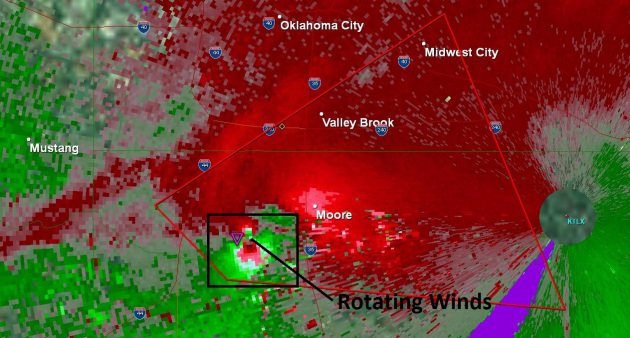
Tornado Warning Time Could Be Improved by Drones. Is this the next big breakthrough in tornado detection/confirmation/tracking? Here's an excerpt from KOTV.com in Tulsa, Oklahoma: "...Thirteen minutes. That is the average time between the detection of a tornado forming to when it touches down, leaving people in its path scrambling to find a safe place. This countdown was a reality for parts of the Midwest and south earlier last week as severe storms and tornados battered the areas leaving at least 14 people dead. Unlike other weather systems, tornados form quickly, are hard to predict and even harder to track. Jamey Jacob and his team from Oklahoma State University are working on a set of drones designed to fly into and analyze severe weather systems. "Meteorologists are very good at predicting when and where the storm is going to develop but not so good at determining when a storm is going to form a tornado at a particular place or at a particular time," Jacob said..."
Housing Quality Plays Role in Tornado Risk. Is it demographics or climate change or a mixture of the two? Here's an excerpt from Realtor Magazine: "...It’s the rising number of mobile homes that has researchers concerned as the threats from tornadoes grow. There are about 9 million mobile homes in the U.S. and an average of about 1,200 tornadoes per year, the most of any country. “If the climatologists are right about the continuing effects of climate change, then people living in mobile homes could be particularly vulnerable to tornadoes in years to come,” says Mark Skidmore, coauthor of the study and an MSU economics professor. In studying tornado fatalities in the U.S. from 1980 to 2014, researchers found that 2,447 tornado-related deaths occurred. The bulk of the deaths occurred in the region of the Midwest and Southeast labeled “tornado alley.” Texas has the most tornadoes annually at 150, followed by Kansas at 80, Oklahoma at 64, and Florida at 61. Florida has the most mobile homes in the nation at 849,304, followed by Texas at 731,652..." (File image: NOAA).
Cheapest Life Insurance You Can Buy. Time to go on my annual rant, reminding you to invest a whopping $20-40 on a NOAA Weather Radio, if you haven't already done so. Media, apps, sirens are all great, but this is probably the only device that will wake you up at 3 AM if a tornado is heading toward your neighborhood. Get a battery-operated radio, in case power goes out, and make sure it has "SAME" technology, so you can program in your county (and not be needlessly warned for nearby counties). They are worth every penny. Here are a few options available on Amazon.
As Environmental Battles Shift to States, Renewable Energy Adoption Could Come Down To Economics. Here's an excerpt from TechCrunch: "...Many of these are built in as best practices almost independent of regulatory requirements,” said Muro. “Much of the cleantech, advanced-economy-focused companies already embraced these practices as relentlessly trying to drive carbon and pollution out of their supply chains. They see it as a broader consumer appeal and are moving ahead irregardless of the immediate regulatory scrimmaging at the moment.” Wall street banks and big insurance companies are also pushing policies that encourage businesses to take their climate responses into account. The insurance industry is beginning to see losses rise from climate related events, and they’d like to encourage customers to do more to address those impacts. Meanwhile investment funds are beginning to drop fossil fuel stocks. A December report in the New York Times indicated that many big investors smell trouble in their traditional energy portfolios for a number of reasons..."
Photo credit: "A work crew for the Pittsburgh company Energy Independent Solutions installs solar panels at a community building in Millvale, Pa." Reid Frazier/The Allegheny Front.
Bosses Believe Your Work Skills Will Soon Be Useless. Prepare for a career of lifelong learning and retraining - that won't be optional. Here's a clip from The Washington Post: "Nearly a third of business leaders and technology analysts express “no confidence” that education and job training in the United States will evolve rapidly enough to match the next decade’s labor market demands, a new report from the Pew Research Center finds. About 30 percent of the executives, hiring managers, college professors and automation researchers who responded to the Pew survey felt future prospects looked bleak, anticipating that firms would encounter more trouble finding workers with their desired skill sets over the next decade. “Barring a neuroscience advance that enables us to embed knowledge and skills directly into brain tissue and muscle formation, there will be no quantum leap in our ability to ‘up-skill’ people,” wrote Andrew Walls, managing vice president at Gartner, an IT consulting firm..."
Illustration credit: Michael Paul Young / YouWorkForThem.
The
annual impact of tornadoes is expected to increase threefold over the
next few decades due to the "twin forces of increased climate
variability and growth in the human-built environment," according to the
study, which is published online in the journal Regional Science and
Urban Economics.
"If the climatologists are right about the continuing effects of climate change," said Mark Skidmore, MSU economics professor and co-author of the study, "then people living in mobile homes could be particularly vulnerable to tornadoes in the years to come."
The researchers investigated underlying factors of tornado fatalities in the U.S. from 1980 to 2014. There were 2,447 tornado-related deaths during that period; the bulk occurred in the "tornado alley" region of the Midwest and Southeast.
Read more at: https://phys.org/news/2017-05-climate-tornadoes-mobile-homesa-dangerous.html#jCp
"If the climatologists are right about the continuing effects of climate change," said Mark Skidmore, MSU economics professor and co-author of the study, "then people living in mobile homes could be particularly vulnerable to tornadoes in the years to come."
The researchers investigated underlying factors of tornado fatalities in the U.S. from 1980 to 2014. There were 2,447 tornado-related deaths during that period; the bulk occurred in the "tornado alley" region of the Midwest and Southeast.
Read more at: https://phys.org/news/2017-05-climate-tornadoes-mobile-homesa-dangerous.html#jCp
TODAY: Windy with increasing clouds. PM showers, even a T-shower. Winds: SE 15-25. High: 67
MONDAY NIGHT: Few lingering showers. Low: 52
TUESDAY: More clouds than sun, mild. Winds: N 7-12. High: 69
WEDNESDAY: Unsettled, chance of showers. Winds: E 7-12. Wake-up: 50. High: 64
THURSDAY: Partly sunny and pleasant again. Winds: E 7-12. Wake-up: 47. High: near 70
FRIDAY: Lot's of lukewarm sun. Winds: NW 5-10. Wake-up: 49. High: 74
SATURDAY: Warm sun, potentially irresistible. Winds: S 8-13. Wake-up: 50. High: 77
SUNDAY: Windier, more humid. Taste of summer. Winds: S 10-20. Wake-up: 55. High: near 80
Climate Stories...
Rep. Foster, Tom Skilling: Denying Climate Change Like Denying Smoking Dangers. Daily Herald has the story; here's a clip that got my attention: "...Skilling
said the most recent example of climate change is the rampant flooding
throughout the Midwest. Increased pockets of violent storms and
tornadoes are also key indicators of warming causing increasing amounts
of trapped moisture. He also showed time-lapse videos of melting
glaciers around the world. "People say that the climate has always
changed," Skilling said. "The changes happening now are happening at a
rate 10 times faster than anything in the past." Foster built off
Skilling's cigarette analogy to explain why Congress has not fully
embraced human responsibility for climate change. "With cigarette
smoking, it took decades for our government to respond because there was
more on one side of the debate," Foster said. "That generates fake
science and money to bribe politicians into not taking action. As a
result, tens of thousands of people died needlessly..."
Why Canada Secretly Loves Climate Change. Not sure "love" is the right word, but there's little doubt that our neighbors to the north will benefit more than most countries. Here's a clip from Business Insider: "...Pleasant weather is just the retail end of Canada’s climate change perks. An assessment from our federal government lists the many “opportunities” climate change will present to Canadian agriculture:
“...an expansion of the growing season to go along with milder and shorter winters. This could increase productivity and allow the use of new and potentially more profitable crops....These warmer temperatures would also benefit livestock production in the form of lower feed requirements, increased survival rates of the young and lower energy costs. Climate change could improve soil quality.”However, the biggest boon to Canada as the world approaches permanent catastrophe is our wealth in natural resources: specifically, fossil fuels and freshwater. According to UCLA geographer Laurence C. Smith, climate change could turn Canada into a “global superpower” by 2050..."
Image credit: Participant Media.
Extreme Weather Flooding the Midwest Looks a Lot Like Climate Change. Warmer air holds more water vapor. Full stop. Here's an explainer at InsideClimate News: "...Parts of Missouri, Illinois, Indiana, Arkansas and Louisiana received 10 to 15 inches of rain in the past seven days, according to the National Weather Service, resulting in record crests of numerous rivers across the central United States. Extreme storms like these have become more common as global temperatures have risen and the oceans have warmed. Some have the clear fingerprints of man-made climate change. "Of course there is a climate change connection, because the oceans and sea surface temperatures are higher now because of climate change, and in general that adds 5 to 10 percent to the precipitation," Kevin Trenberth, a climate scientist with the National Center for Atmospheric Research, said. "There have been many so-called 500-year floods along the Mississippi about every five to 10 years since 1993..."
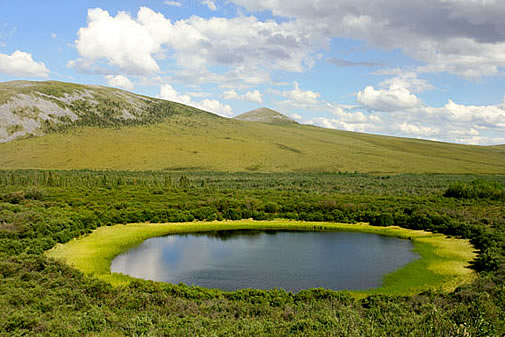

Is Climate Changing Cloud Heights? Too Soon To Say. Clouds have a cooling effect, but it's unclear how a warmer atmosphere will impact cloud formation. Here's an excerpt from NASA: "...A new analysis of 15 years of NASA satellite cloud measurements finds that clouds worldwide show no definitive trend during this period toward decreasing or increasing in height. The new study updates an earlier analysis of the first 10 years of the same data that suggested cloud heights might be getting lower. Clouds are both Earth's cooling sunshade and its insulating blanket. Currently their cooling effect prevails globally. But as Earth warms, the characteristics of clouds over different global regions — their thickness, brightness and height — are expected to change in ways that scientists don't fully understand. These changes could either amplify warming or slow it. Pinning down some of the uncertainties around clouds is one of the biggest challenges in determining the future rate of global climate change..."
Photo credit: "Climate change may eventually change global cloud heights, but scientists need a longer data set to know whether that's happening already." Credit: NASA.
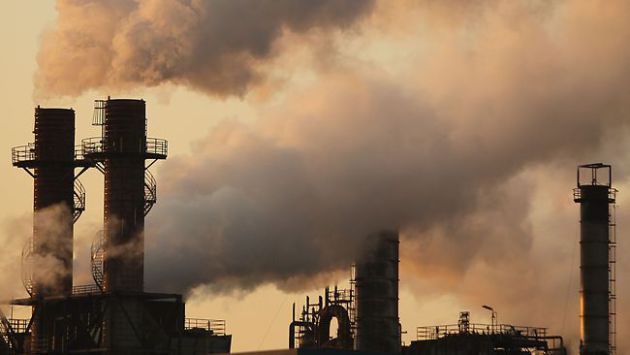
How to Make a Carbon Tax Insanely Popular. A story at The Week offers up one way to make a carbon tax fair for the poor and disadvantaged: "...So
what to take from this? Coalitions created across the traditional
liberal-conservative or Democrat-Republican divides will be in trouble.
Right-wing supporters will push towards offsetting the carbon tax with
other tax reductions, or elimination of regulations. Baker and the other
Republicans pushing the carbon tax, for instance, would like it to
replace Obama-era climate regulations. But to be broadly popular, a
carbon tax simply cannot be divorced from a broader left-populist
economic agenda. To succeed politically, it will need to come in a
broader package of policies, the net effect of which leaves most
Americans better off. As Paul argued: "The environment is something
that, when we're born, each and every one of us has a common piece of
ownership. And a tax and dividend policy restores that notion of common
ownership."
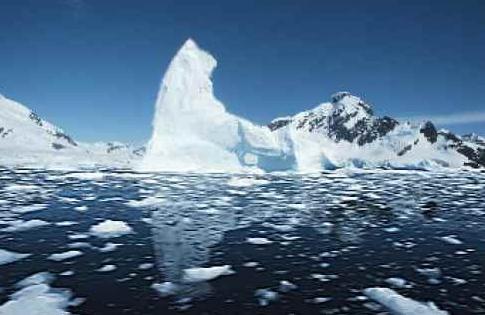
- Replacing fluorocarbons used in refrigeration and air conditioning equipment with atmospherically benign alternatives like propane and ammonium.
- More electric generation from onshore wind turbines.
- Reducing food waste by one-half worldwide.
- Shifting more of the global diet from meat to plants.
- Restoring tropical forest on about half the degraded acreage identified as plausible reforestation locales.
- Assuring 13 years of schooling for girls around the world, especially in the poorest countries, as the surest path to voluntary population control.
- Encouraging family planning, with enhanced access to contraception, as a corollary effort.
- More utility-scale “solar farms...”
Map credit: "This map shows five of the 17 communities in the U.S. that are in the process of climate relocation. Upwards of 13 million Americans will be at risk of displacement from a projected 0.9 m rise in sea levels by 2100." (Center for Progressive Reform).
No comments:
Post a Comment